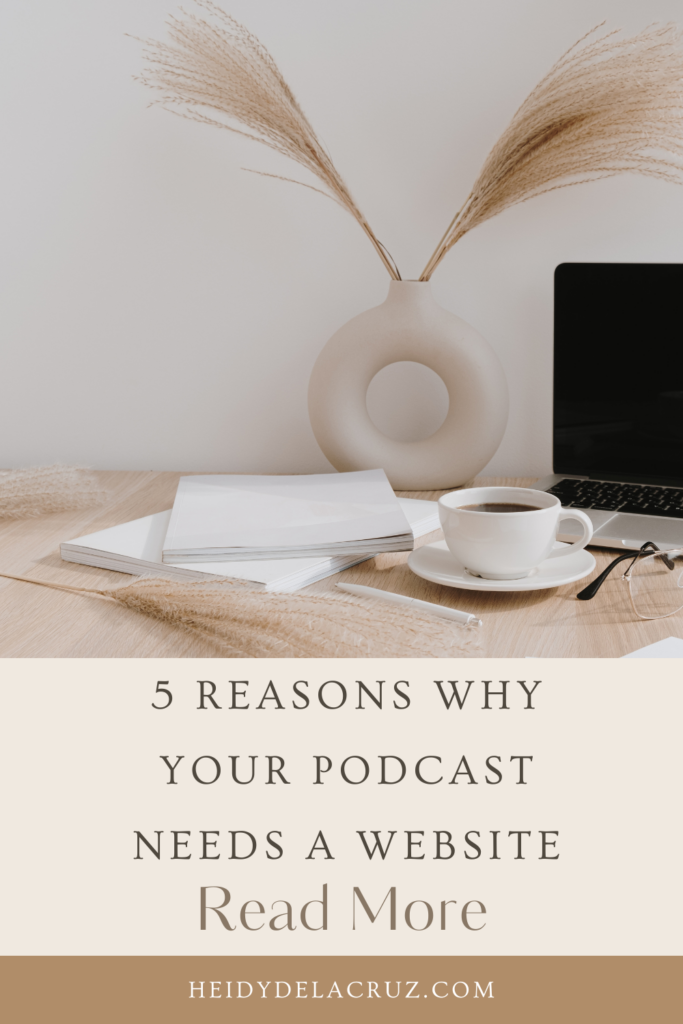There are various reasons why someone starts a podcast. It could be a hobby, a passion project, social change, or the podcast is part of their business. Regardless of the reason, every podcast should have a website. When starting a podcast, you connect with your audience on a more intimate level, and you build trust with them as time goes on. But your podcast needs a home online, outside of Apple Podcast or Spotify. And that is where your website comes in. Today, let’s get into why your podcast needs a website!
Google Is Still the Number One Search Engine (SEO is King)
When searching online, Google remains the first search engine people turn to, ahead of Apple and Spotify. Don’t get me wrong, people search on Apple or Spotify, but that’s when they are searching for podcasts talking about a specific topic; this is where Podcast SEO comes into play. However, that’s a separate conversation – when looking for answers, people go to Google.
Having a website gives your podcast a chance to be discovered by new listeners who may not have found you otherwise. Without a website, you’re leaving discoverability on the table. Your podcast episodes (turned into blog posts) can rank in search results, bringing organic traffic and potential subscribers straight to your show.
Long-Term Content Builds Trust
Don’t let these internet streets fool you, organic long-term content is still king (SEO). Consider this: a podcast episode transformed into a blog post creates lasting content that lives on the internet forever. And it continues to work for you long after it’s published. Unlike a social media post that the algorithm stops pushing to audiences in 24 hours, a blog or podcast episode can be discovered months or even years later. That’s powerful, that’s longevity, that’s what your podcast and business should be built on, and it builds trust with your audience over time. Which is likely why you started your podcast in the first place: to share knowledge, tell stories, and connect in a meaningful way.
Short-Term Content Brings People to Your Ecosystem
Yes, short-form content like Instagram Reels, TikToks, or YouTube Shorts has its place. But those platforms are rented spaces; you don’t own them, and algorithms change all the time. Instead of relying on them as your central content hub, use them strategically. Post video clips and soundbites to grab attention, then direct people to your podcast episodes and, ultimately, your website. From there, you can grow your email list and bring them deeper into your ecosystem.
Having short-form content as your central content hub poses a significant risk since you don’t own it. When social media shuts down, glitches, your profile or posts get flagged, or your page gets shut down completely, this is a risk of losing all your audiences! With your podcast, your website, and your email list, you won’t have to worry about any of that. All of this ties into my next point.
You Own Your Website—Not Social Media
As mentioned above, social media platforms can shut down, accounts can be hacked, and algorithms shift. That’s risky if you’re only relying on social media to get new listeners and if your entire podcast presence lives there. Your website, on the other hand, is your digital home. Just like your podcast, you own it. It’s not “rented” online real estate. Having your own website means you control the narrative, you’re not censored, you control the design, and the audience experience.
A Website Is Important if Your Podcast Ties Into Your Business
If your podcast supports your business, having a website is non-negotiable. Your audience should easily find your show alongside your services or products. And if you already have a business website, make sure your podcast is accessible there. You can achieve this by adding a link to your podcast on your menu or by converting your podcast episodes into blog posts, embedding them within the blog posts. This not only strengthens your brand but also provides potential clients or customers with a convenient way to view all your offerings in one place.
How to Create a Podcast Website
Luckily, setting up a podcast website isn’t complicated. You have options:
- DIY Website Platforms: Use WordPress or Squarespace to create a site and publish blog posts for each podcast episode. I even wrote an article on how to turn your episodes into blog posts! Link is above.
- Podcast Hosting Platforms: If you host your podcast on BuzzSprout, they’ll create a simple website for you automatically. Here’s my affiliate link if you’d like to check it out.
Either way, the important part is making sure your podcast has a home outside of podcast directories and social media.
Conclusion on Why Your Podcast Needs a Website
Your podcast deserves to be more than just audio floating around on apps. A website anchors your show, helps you get found on Google, and strengthens the trust you’re already building with your audience. Use short-term content to attract people, but let your website and long-term content keep them engaged.
Ready to start a website for your podcast? I can help! Send me an email at heidy@heidydelacruz.com to get started.
With Love, Your Podcast Coach Heidy
Check out my free Podcasting Resources at – https://stan.store/heidydelacruz
Sign up for my newsletter to join the podcasting coaching community and receive the latest tips and insights!
Other Posts You May Enjoy:

